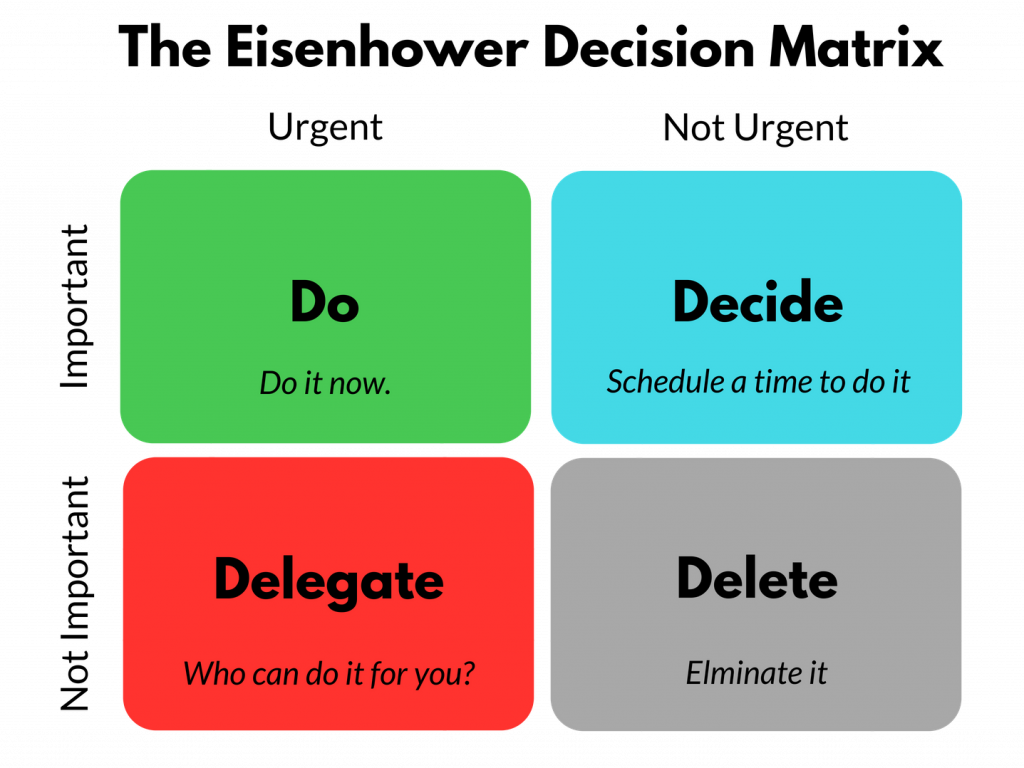
Productivity and Effective time management - The recipe for success
In the fast-paced world we live in, effective time management is crucial for increased productivity. By managing our time properly, we will complete additional tasks in less time and reach our goals faster. In this article, we’ll explore ten time management methods that will make it easier to increase productivity.
Strategy #1: Order the tasks
One of the key elements of effective time management is prioritizing tasks. By distinguishing the most necessary tasks and prioritizing them, we will specialize in the tasks that will have the greatest impact and make it easier to create the most important progress. A great tool for prioritizing tasks is the Dwight Eisenhower Matrix, which helps us rearrange tasks according to their importance and urgency.
“…What is the Eisenhower Matrix?
The Eisenhower Matrix is a productivity, prioritization, and time-management framework designed to help you prioritize a list of tasks or agenda items by first categorizing those items according to their urgency and importance.
Also called an Eisenhower Decision Matrix, Eisenhower Box, or Urgent-Important Matrix, this approach consists of drawing a four-box square with an x-axis labeled Urgent and Not Urgent, and a y-axis labeled Important and Not Important. Then, group the items on your list into one of the four boxes, with the Urgent-and-Important box in the upper left requiring your immediate action…”

By using this matrix, we will be able to differentiate between tasks that are necessary and urgent, as well as those that are necessary but not urgent.
Strategy #2: Produce a list of priorities
Creating a priority list will be a robust time management tool. It helps us organize our tasks and provides a transparent summary of what needs to be done. To make an effective priority list, it’s important to break tasks down into smaller, more manageable chunks, and order them in order of importance taken care of.
Strategy #3: Use a Planner or Calendar
Using a diary or calendar will be effective with slow and organized management. By scheduling specific times for various tasks, we will quickly realize that we tend to waste our time, it will also prevent us from overloading ourselves with an excessive amount of work at one time [Time management]. This approach is also a responsible plan to incorporate breaks and time periods into your schedule to allow you to rest and recharge.
Urgent | Not Urgent | |
Important | Do these tasks as soon as possible. Examples:
| Defer these tasks until all urgent and important tasks have been completed. Examples:
|
Not Important | Delegate these tasks to the appropriate people who can manage them. Examples:
| Delete these tasks – they are often time wasters. Examples:
|
Strategy #4: Set Specific, Achievable Goals
Setting a clear and specific goal is an essential step in time management. By setting specific goals, we have a transparent understanding of what we would like to achieve and can work towards it in a focused and organized way. it is also necessary to align achievable goals through unity because setting impossible goals will lead to frustration and a lack of motivation.
Strategy #5: set aside time dedicated to tasks
Blocking out time dedicated to specific tasks will be effective through increased productivity. By setting aside a particular time of the day or week to specialize in a selected task, we will eliminate distractions and stay focused on what needs to be done.
Strategy #6: Take breaks
Taking breaks is an essential part of effective time management. By allowing ourselves time to rest and recharge, we will approach our tasks with renewed energy and focus. it is important to strike a balance between functioning and breaks to ensure that we tend to be productive without exhausting ourselves.
Strategy #7: Eliminate distractions
Distractions will be a significant obstacle to productivity. By distinguishing and minimizing distractions in our work setting, we will keep centered on our tasks and create the foremost of our time. Some methods for eliminating distractions embody setting boundaries with coworkers, turning off notifications on our devices, and finding a quiet place to figure out.

An article from the University of Georgia “Time Management: 10 Strategies for Better Time Management” clearly states:
Manage Time-Wasters
Reduce or eliminate time spent on these activities by implementing some simple tips.
Handheld Devices
Take advantage of voice-to-text features such as transcribed voicemails or to make notes or draft emails and text messages when you are on the go.
Avoid small talk. Stay focused.
Take any necessary action immediately following a call.
Impose screen time limits and regularly monitor your digital wellness (see Strategy 10).
Schedule breaks from your devices.
Email
Set aside a specific time to view and respond to emails, but don’t let it accumulate to the point it becomes overwhelming to sort.
Turn off notifications for email.
Handle each item only once if possible.
Immediately delete or unsubscribe from junk emails.
Keep address books up-to-date and organized.
Utilize built-in shortcuts to sort emails.
Unexpected Visitors
Schedule time for face-to-face visits.
Inform visitors of your time constraints and politely offer to reschedule.
Set a mutually agreeable time limit for the visit.
When someone comes to the door, stand up and have your meeting standing to help keep it brief.
In-Person and Virtual Meetings
Know the purpose of the meeting in advance.
Arrive early.
Start and end the meeting on time.
Prepare an agenda and stick to it. Use a timed agenda, if necessary.
Don’t schedule meetings unless they are necessary and have a specific purpose or agenda.
Use recording software or designate a note-taker.
Family Obligations
Use and sync virtual calendars for easy sharing between busy family members.
Make each family member responsible for consulting the master calendar for potential conflicts.
Create a central area or agreed-upon app for posting communications such as appointment reminders, announcements, and messages.
Strategy #8 Delegate Tasks
Delegating tasks to others will be effective by freeing up time and increasing productivity. By assigning tasks to team members or outsourcing certain tasks, we will be able to use our resources in the tasks that are most vital to us, and that produce the most value and progress. It is important to delegate tasks effectively while setting clear perspectives and providing the necessary funds and support.
Strategy #9 Use time mining tools and technology.
There are several tools and technologies available in the market that will allow us to manage our time effectively. Examples include designing operating packages, time-tracking applications, and productivity extensions for our operating program.
Strategy #10 follow cognizance and reflection.
Self-awareness is a vital side of effective time management. By understanding our habits, strengths, and weaknesses, we will establish areas where we will improve our portions of time that will produce further progress. Some tips for active knowing and thinking include keeping a journal, setting aside time for reflection, and seeking feedback from others.
Conclusion
Whatever time management strategies you use, take time to evaluate how they have worked for you. Do you have a healthy balance between work and home life? Are you accomplishing the tasks that are most important in your life? Are you investing enough time in your own personal well-being? If the answer is “no” to any of these questions, then reevaluate your time management strategies and transition to ones that will work better for you. Successful time management leads to greater personal happiness, more accomplishments at home and at work, and a more satisfying future.
In conclusion, effective uptime is essential for increased productivity. By applying styles such as prioritizing tasks, using a diary or schedule, setting specific and achievable expectations, setting aside time for tasks, taking breaks, forbidding distractions, commission duties, and active knowledge and thinking, we will make the best of our time and quickly realize our claims. It’s important to research the styles of timing operations that work for you and be open to trying new approaches if necessary.
Good time management clearly avoids additional stress











7 Comments
Comments are closed.